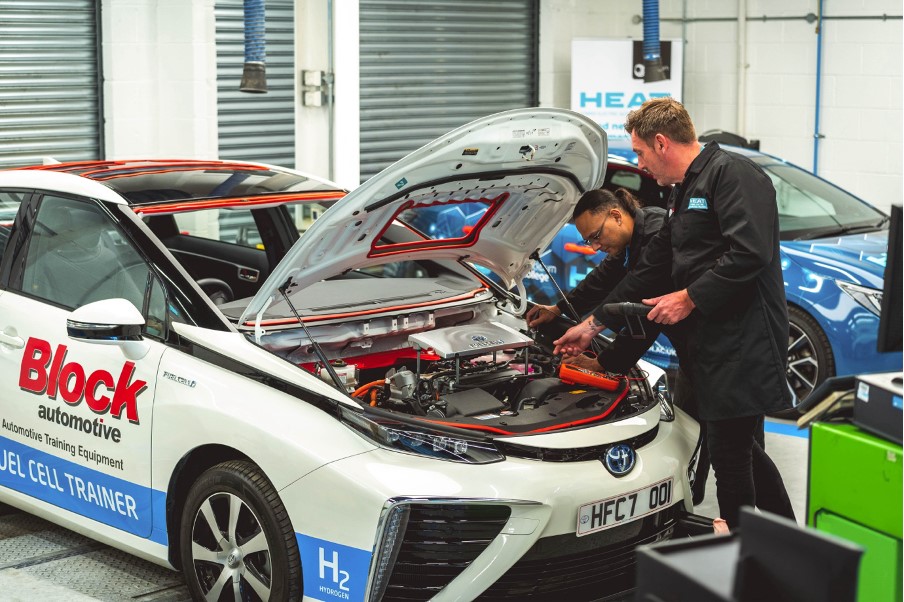Michael Yerbury, Advanced Automotive Technical Trainer at Blackburn College’s Hybrid Electric Automotive Training Centre (HEAT), discusses how hydrogen fuel cell technology has the potential to transform the net zero landscape.
Hydrogen fuel cell technology is only expected to grow. In fact, according to a joint government-industry study, there could be over one and a half million hydrogen-powered vehicles on our roads by 2030.1
Hydrogen vehicles produce zero harmful tailpipe emissions, emitting only water vapour, representing a promising future for the UK’s automotive industry by offering an alternative to traditional fossil fuels, as well as another option for drivers who are concerned about range or accessibility for charging for electric vehicles (EVs).
Overall, it’s an exciting time to be in the automotive industry.
We all know that we need to work together to meet the country’s net zero goals and improve air quality. Which is why Blackburn College is already putting in place the training needed to ensure that the industry has the necessary knowledge and skills for the UK’s transition to cleaner, greener transport.
What is the current state of hydrogen fuel cell technology in the UK?
Hydrogen fuel-powered vehicles are starting to make their way into the consumer market, with Hyundai releasing a Nexo SUV and BMW aiming to deliver hydrogen cars by 2025.
These cars offer a similar driving experience to EVs – they’re lighter, quicker, and quieter. The main difference for the driver is that range anxiety will be completely eliminated. The means to fill up as you would with petrol or diesel and hit the road with zero emissions is an exciting concept.
The potential is also there to transform the lighter commercial vehicle market. The technology will allow for trucks weighing just seven and a half tonnes and ranges of over 150 miles to travel through clean air zones, potentially removing current payload and additional fee challenges for businesses who rely on LCV fleets.
What are the challenges associated with hydrogen fuel cell technology?
In a perfect world, we, as a country, would be able to produce enough renewable energy from wind, solar and others to drive the green transition.
Efficient hydrogen production for automotive use is still in the works, with the majority of hydrogen produced for fuel falling under the ‘grey area’ of gas turbine electricity using natural gas. We, as a country, need to focus on this bigger picture and the entire supply chain to ensure hydrogen adoption is a clean, viable future concept for transportation.
Another area to address is revamping the refuelling infrastructure. There are currently around 11 fuelling stations in the UK, and only six of them are open to the public. It’s not an unfamiliar journey now, though. Looking back at how far EV charging networks have come over the past few years does put an air of optimism to the adoption of hydrogen cars on the road.
But it is somewhat of a chicken and egg situation when it comes to purchasing decisions and hydrogen stations.
What are the skills needed for this type of technology?
When you add up globally how much less emissions would be produced if petrol and diesel cars were to be replaced with hydrogen and electric, it’s a no-brainer we start adopting these technologies and get trained to deal with them.
A recent study conducted by Hydrogen UK is predicting there will be 8,500 jobs in the UK in the next five years in hydrogen, and technicians need to be prepared for this shift with training and attaining qualifications.2
At Blackburn College, home to one of the UK’s first IMI-accredited hydrogen training pilots, there is an opportunity to gain the skills needed to prepare for the arrival of mass adoption of hydrogen vehicles. The College is already seeing a rising demand in technicians wanting high-level qualifications.
Blackburn College’s Hybrid Electric Automotive Training (HEAT) Centre currently offers Level 1 hydrogen training and will shortly be offering Level 2. The College is one of the leading training providers in the North West prepared with the technology and skills to provide technicians with robust qualifications.
Thanks to centres like HEAT, garages can upskill their workforces quickly and ensure they not only remain relevant in a net zero future, but can meet the demands of car owners today.

